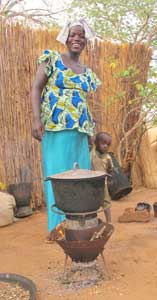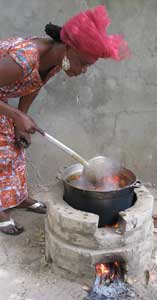Improved Cookstoves
REAP-Canada’s Improved Cookstove Program: developing innovative, efficient stoves to fight deforestation and poverty!
Throughout the developing world, many women use open fires with solid fuels including firewood, dung and charcoal for their cooking purposes. Although practical in their simplicity, these fires have poor combustion efficiency, require a significant amount of fuel to cook a meal, and also negatively impact women’s health. As the global population continues to grow, the environmental and health impacts will also continue to grow unless a better alternative is developed and adopted. The importance of improved cookstoves first became apparent to REAP during their agricultural development project in the Philippines in 1998. REAP began to develop improved cookstoves after seeing an alarming reliance on firewood and charcoal which not only is very costly but also results in wide-spread deforestation and environmental degradation. In the Philippines, there were abundant piles of agricultural residues in rural communities, and so REAP and local partners began by developing a locally appropriate stove that could burn these as a fuel thereby solving both a fuel and a waste problem.
REAP has designed two improved cookstoves that bring many benefits to the women who use them and their surrounding environment:
Efficiency: All of REAP’s stoves are designed by experts to maximize their combustion quality, which not only saves on fuel but also reduces smoke.
Affordability: One of the primary factors involved in stove design is affordability, and with their improved combustion efficiency, users also save money and/or time on fuel.
Environmentally friendly: Designed either to efficiently burn agricultural residues instead of fuelwood or to burn fuelwood more efficiently means that communities that are adopting and using REAP’s improved cookstoves are able to reduce their negative impact on forests and the environment while also lowering emissions and reducing women’s and children’s exposure to smoke.
Simplicity: Simple by design, REAP’s stoves are built in-country using local workmanship. The simple and intuitive designs mean that women are able to adopt the stoves and learn to use them easily.
Local Resource Use: Built with local resources and craftsmanship and burning local agricultural residues that are abundantly available means that women spend less time gathering fuel, less money on fuel, while developing and strengthening the local economy.
Versatility: The elegance of REAP’s simple stove designs is that their simplicity is accompanied by versatility. They can burn multiple fuels that are readily available; they can be used to cook a variety of meals quickly; and one model is custom-designed for its family.
Participatory Design: Stove beneficiaries have also played an important role in developing locally appropriative improved stove designs through needs assessments and user-evaluation trials of different stoves. This process is crucial for local acceptance of new technologies.
REAP’s vision is to design and disseminate locally-built, resource-efficient, waste-burning improved cookstoves to reduce environmental degradation, deforestation, and negative health impacts caused by current cooking technologies. REAP’s interest does not stop there, however: REAP is striving to implement improved cookstoves that are popular and used to their full potential, and does so by conducting stove demonstrations and community awareness meetings with local partners while also collecting feedback from users in order to improve the programs and stoves themselves.
To-date, REAP has designed two improved cookstoves. To find out more about REAP’s improved cookstoves, check out the following links:
Mayon Turbo Stove |
No Flay: Claybrick Woodstove |




